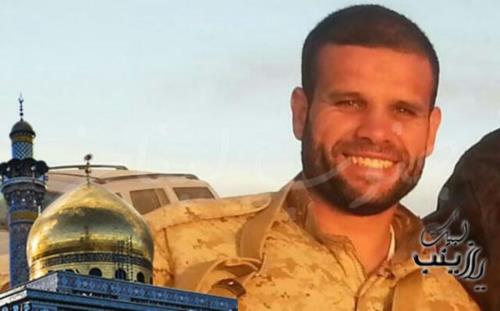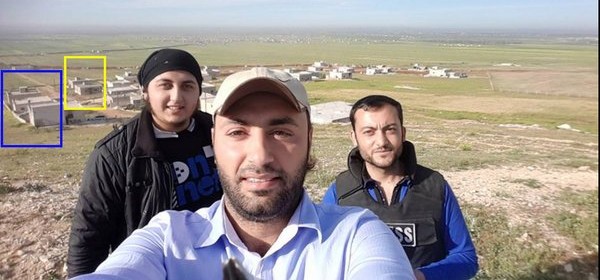PHOTO: Rebels take a selfie on a hill near al-Eis, south of Aleppo, on Saturday morning
LATEST
- Names & Photos of 7 Hezbollah Fighters Killed in Aleppo Province
- Opposition-Rebel Bloc: “We Do Not Expect Anything to Come of Talks”
- Rebels: We Repelled Regime Attacks in East Ghouta
- US: We Are Training “Dozens” of Rebels to Fight Islamic State
SATURDAY FEATURES
Iranian & Russian Media’s False Image of “Palmyra Massacre” by ISIS”
How the Assad Regime Depends on Mass Arrests
Rebels and Jabhat al-Nusra have advanced against foreign militia, Iranian units, and Syria’s troops south of Aleppo city.
Friday’s attacks took some of the territory gained by the pro-Assad forces in their offensives, enabled by Russian airstrikes, since October. The most significant gain was the town of Tal al-Eis, overlooking the Aleppo-to-Damascus highway.
The rebel-Nusra operations, the most significant since last autumn, were carried out in several locations across the southern Aleppo front. The town of Khan Touman, also near the main highway, was attacked, and claims circulated of the capture of the villages of Abu Ruwayl, Hawbar, and Khalidyah. Rebels are also said to be closing on al-Hader, another town taken in regime offensives in the autumn.
The attack appeared to catch the foreign militias and Syrian troops by surprise. Local sources said the regime lines were weakened because of the movement of troops to the successful offensive against the Islamic State in Palmyra in central Syria.
State media has not acknowledged the losses; however, a pro-regime site has admitted the rebel takeover of Tal al-Eis.
Footage of the operations:
A first-person view of the attacks, provided by Jabhat al-Nusra:
Free Syrian Army units moving into Khalidyah village:
Rebels say their operations are a “counter-offensive” because a February 27 agreement for “cessation of hostilities” was broken by regime attacks in Aleppo Province. The leading faction Ahrar al-Sham posted photos of its mobilization for the offensive:
#ahraralsham #syria
Loading the cannons to repel the Assad's militias violations in Aleppo southern countryside pic.twitter.com/x1GdDjDQyH— Ahrar Al-Sham inter (@ahrar_alsham_en) April 1, 2016
#ahraralsham
A sheikh remarks before launching a counter battle to dominate Assad positions in Abu-Rwayil in #Aleppo pic.twitter.com/Ve4HNWRXNV— Ahrar Al-Sham inter (@ahrar_alsham_en) April 1, 2016
Names & Photos of 7 Hezbollah Fighters Killed in Aleppo Province
The Janoubia website posts the names and photos of seven Hezbollah fighters killed in southern Aleppo Province.

The site does not give further details of timing or a possible link to the rebel-Jabhat al-Nusra that surprised pro-Assad foreign militias on Friday.
Opposition-Rebel Bloc: “We Do Not Expect Anything to Come of Talks”
The opposition-rebel bloc has expressed doubt about whether renewed political talks in Geneva will bring a resolution of the crisis.
“There is no international will, especially from the U.S. side, and I do not expect anything to come of the negotiations,” said Riad Hijab, the coordinator for the Higher Negotiation Committee (HNC), in an interview on Friday.
Hijab said the HNC will attend the next round of talks, scheduled for April 11, but “I will be clear to our people: we have no optimism concerning the negotiations process.”
President Assad said earlier this week that he will not accept a “transitional governing authority”, a central element of international discussions since 2012.
See Syria Daily, March 31: Assad Rejects Transitional Government
Asked about coordination between Moscow and Washington over the talks, Hijab said:
We are not afraid of the U.S.-Russian rapprochement.But we fear the secrecy, the lack of clarity and lack of transparency.
We do not know what has been agreed….What is happening in Syria is a proxy war.
The second set of Geneva talks adjourned on March 25 after 11 days. UN envoy Staffan de Mistura circulated a document for discussion, but the HNC’s lead negotiator, Mohammad Alloush, has said that the text is not satisfactory.
Rebels: We Repelled Regime Attacks in East Ghouta
Rebels claim that they repelled the latest ground attacks by the Syrian military in the East Ghouta area near Damascus.
The spokesman for the Jaish al-Islam faction, Captain Islam Alloush, said r=rebels drove off Assad forces on both the Bala and Zibdeen fronts, killing at least 22 troops and destroying armored vehicles.
The ground assaults were supported by about 20 airstrikes and six surface-to-surface missiles on the outskirts of Bala.
The attacks came as regime warplanes hit civilian areas near Damascus, killed at least 37 people since Wednesday. More than 30 of the dead were in Deir as-Safir, 12 km (7.5 miles) southeast of the capital.
See Syria Daily, April 1: Ceasefire? Regime Bombing Kills 33+ Near Damascus
US: We Are Training “Dozens” of Rebels to Fight Islamic State
The US military said on Friday that it has resumed training of dozens of Syrian rebels to fight the Islamic State.
The US suspended its $500 million train-and-equip program last year after the failure to produce significant numbers of fighters, and the humiliation of the two attempts to deploy rebel units in northern Syria.
The military’s baghdad-based spokesman, Colonel Steve Warren, said the renewed trained includes
identification of targets for coalition airstrikes: “That allows us to bring significantly more fires into play in any of these skirmishes, battles, and firefights that are taking place throughout Syria.”
Warren said no rebels have yet graduated from the program, which is being pursued in Turkey, according to US officials.
The $500 million train-and-equip program, authorized in autumn 2014, had a target of 5,000 fighters. However, the effort was delayed by bureaucracy, and then effectively collapsed when the US insisted that the trainees must battle the Islamic State, rather than pro-Assad forces.
Eventually, a total of 125 men crossed in Syria, but the first group was soon attacked by the jihadists of Jabhat al-Nusra, and the second turned over its weapons to Nusra within days of its entry.
The new program does not seek to create entire units, but to take small groups of fighters from the frontlines.
“If it works we’ll do more. And if it doesn’t, we’ll shift again,” Warren said.

